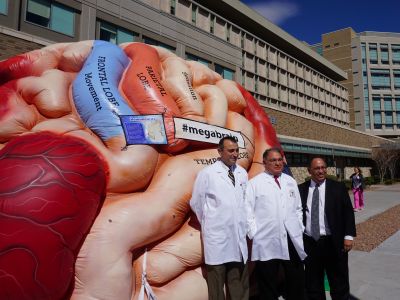UMC Announces Comprehensive Stroke Certification
 March 16, 2018
March 16, 2018
Download PDF
EL PASO, Texas – The El Paso region and University Medical Center of El Paso made history March 9 with the announcement of Comprehensive Stroke Certification from The Joint Commission. Never before has a hospital in El Paso held Comprehensive Stroke Certification, with the closest similarly certified hospitals in San Antonio to the east, and Phoenix to the west. No hospitals in New Mexico have the certification.
“This is a major step forward for El Paso and UMC but most importantly, this represents the dawn of a new era in stroke care for anyone affected by strokes – as well as greater comfort for their families,” said Jacob Cintron, UMC President & CEO. “Strokes and other brain injuries usually occur suddenly, giving victims little warning. Our new certification puts UMC at the forefront of expertise and readiness to care for victims of complex strokes.
“In partnership with physicians from Texas Tech University Health Sciences Center El Paso, along with our UMC Neuro Critical Care team of physicians, nurses, techs and others,” he said, “UMC now brings the pinnacle of complex stroke care and readiness to El Paso – a level of care sought by hospitals across the nation.”
UMC’s Comprehensive Stroke Center certification brings with it the designation of the hospital as a Level 1 Stroke Center. UMC is already the region’s only Level 1 Trauma Center but will now also be home to the region’s only Level 1 Stroke Center.
“We have many things to be proud of in El Paso,” said Cintron. “This new level of care certainly adds to that list. This certification represents a long process of validation of expertise and capacity of our team at UMC. It is a process that takes years to accomplish. However, we were able to give El Paso a special place on the national stroke care map, thanks to our UMC physicians and nurses and their teams, along with tremendous leadership and commitment of our Texas Tech Physicians.”
TTUHSC El Paso’s surgeons carry dual roles, working at school as well as at UMC’s Neurosciences Intensive Care Unit. They share in the accomplishment and success of UMC’s Comprehensive Stroke Certification.
The comprehensive stroke center designation will deliver a positive impact to a region that is making great strides in improving health care access and education for its citizens, said Dr. Richard Lange, M.D., M.B.A., president of Texas Tech University Health Sciences Center El Paso.
“First and foremost, for our patients it means they now have access to the best care available—right here in El Paso—for even the most complex cases,” said Lange. “For our students and residents, it means they get exposure to the best training opportunities, facilities, and state-of-the-art diagnostic and therapeutic tools. For the city and the region, it elevates health care on the border, making us competitive with other educational institutions across the country when it comes to stroke care.”
One of the physicians from TTUHSC El Paso is also the Neurocritical Care Medical Director at UMC. Dr. Salvador Cruz-Flores. “Designation as a Comprehensive Stroke Center by The Joint Commission means that our institution has the technical and medical capabilities to care for complex stroke patients,” said Dr. Cruz. “It is also a reassurance to the community that we can deliver effective and safe care to these patients without having to send them outside of El Paso. Ours is the first and only comprehensive stroke center with TJC designation in West Texas.”
Dr. Cruz noted the tremendous value that a Comprehensive Stroke Center certification will bring toward educating and training tomorrow’s neurocritical care physicians.
“From a training and education standpoint,” he added, “this designation exposes learners, such as residents and students, to the diagnosis and treatment of these patients. In addition, TJC designation requires involvement in clinical research—that is, the advancement of knowledge in cerebrovascular disease, which can only benefit the community.”


